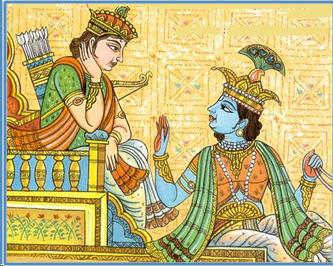
The Classical or Epic Period

A modern rendition of Arjuna and Krishna
By ca. 200 BCE, the early influences which shaped Hinduism were solidified in the form of great epic poems, most importantly the Mahabharata, the longest epic poem ever created. The Mahabharata contains within it The Baghavad Gita (literally, the Song of the Lord). The Baghavad Gita elaborates upon the Upanishads, particularly in that it sets out and explains how it is that humans attain liberation from the cycle of rebirth which is first set out in the Vedas and Upanishads. Basically, Krishna, an avatar (which means a physical manifestation of Brahman), explains to Arjuna, an Aryan prince, the three yogas listed above. However, the concentration is on the first kind of Yoga, Karma Yoga or the yoga of work. Here it is that the concept of Dharma is best explained, because the whole point of Krishna's conversation with Arjuna is to convince Arjuna to fulfill his duty. The trick is that one must fulfill that duty not for one's own benefit, but to offer it to the gods - therefore renouncing thought of any reward, even when it goes without saying that doing your duty leads to the ultimate reward: moksha. When one does one's work on earth, one is ultimately doing Brahma's work. Thus one should do one's work without complaint and, most importantly, without wanting to do someone else's. This belief explains and justifies the caste system in a series of interconnected tenets: First, you were once part of Brahman, but have become separated from him and are now part of life, Samsara. Second, the "easiest" way to be reunited with Brahman is to do your duty in life, without question and without expectation of reward. Third, your duty is dependent on your social position; each caste has a different duty to fulfill. Fourth, doing the duty of the caste into which you were born influences the quality of your next life: if you do not fulfill it, if you question it, or if you desire to do someone else's duty, you will gain negative karma and be reborn in a lower state. Finally, on the other hand, if you fulfill your life-destiny without qualm, you will be rewarded with the ultimate prize: becoming one with The One. What better reason for doing your duty faithfully, without question, and without rancor could there possibly be?